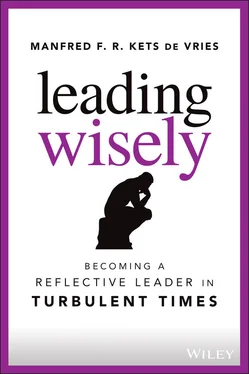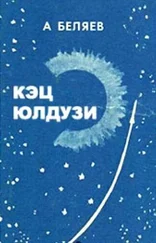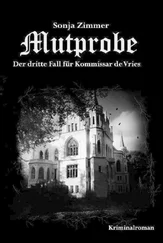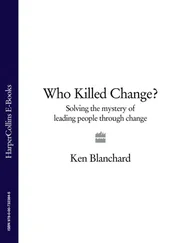Manfred F. R. Kets Vries - Leading Wisely
Здесь есть возможность читать онлайн «Manfred F. R. Kets Vries - Leading Wisely» — ознакомительный отрывок электронной книги совершенно бесплатно, а после прочтения отрывка купить полную версию. В некоторых случаях можно слушать аудио, скачать через торрент в формате fb2 и присутствует краткое содержание. Жанр: unrecognised, на английском языке. Описание произведения, (предисловие) а так же отзывы посетителей доступны на портале библиотеки ЛибКат.
- Название:Leading Wisely
- Автор:
- Жанр:
- Год:неизвестен
- ISBN:нет данных
- Рейтинг книги:5 / 5. Голосов: 1
-
Избранное:Добавить в избранное
- Отзывы:
-
Ваша оценка:
- 100
- 1
- 2
- 3
- 4
- 5
Leading Wisely: краткое содержание, описание и аннотация
Предлагаем к чтению аннотацию, описание, краткое содержание или предисловие (зависит от того, что написал сам автор книги «Leading Wisely»). Если вы не нашли необходимую информацию о книге — напишите в комментариях, мы постараемся отыскать её.
Leading Wisely: Becoming a Reflective Leader in Turbulent Times,
Leading Wisely: Becoming a Reflective Leader in Turbulent Times
Leading Wisely — читать онлайн ознакомительный отрывок
Ниже представлен текст книги, разбитый по страницам. Система сохранения места последней прочитанной страницы, позволяет с удобством читать онлайн бесплатно книгу «Leading Wisely», без необходимости каждый раз заново искать на чём Вы остановились. Поставьте закладку, и сможете в любой момент перейти на страницу, на которой закончили чтение.
Интервал:
Закладка:
In our present-day world characterized by a pandemic, global warming, nuclear threats, terrorism and dramatic income inequalities, we need more than ever leaders who are interested in promoting knowledge and wisdom, not ignorance. We need leaders who transcend people's wish to believe. I am referring to the kind of people who are reality driven, who have a solid grasp of what is possible and are interested in doing things for the common good. It is exactly this kind of leadership that will prevent us from entering doomsday scenarios.
Notwithstanding the many threats that we are facing in this day-and-age, far too many people still do not realize the importance of wisdom for the advancement of humanity. They do not realize that time is running out if we want to save our planet. It is here exactly where wise leaders can make a difference. When leaders possess a degree of wisdom, their actions can contribute to real transformation, a process that is not merely a redecoration of the past but a transformation of humanity that embodies the eternally new.
My agenda
As I have mentioned before, this book should be seen within the context of my discussions with my students about what lessons of life have been important to them in running their organizations. I kept on asking them, as a leader, what would they do to be more effective? What could they do to contribute to creating a better world? What words of wisdom had stuck with them?
In distilling the essence of these discussions, for reasons of simplicity, I have decided to limit myself to eight lessons that pertain to wisdom in the context of leadership and other life challenges. I am quite cognizant of the fact that I could have included more lessons on wisdom, but many of the additional lessons are intertwined within the others. Wisdom, in the end, is a kind of enigma and we need to recognize that from the start. To that end, I have added three chapters upfront where I present some of my more general reflections pertaining to the wisdom equation.
Furthermore, to clarify even more what I want to say, I have included many short stories and anecdotes originating from China, Japan, the Middle East and Europe. The main protagonists in these stories are the Buddha, Zen masters, Aesop (a storyteller believed to have lived in ancient Greece) and mullah Nasrudin (a wise man born in present-day Turkey). Also, included are anecdotes from the Old Testament, the brothers Grimm and a few more contemporary tales. In addition, in each chapter I have added a number of questions to help the reader further explore the various themes that are being discussed.
Given the clinical lens that I often use to make sense of the puzzles that life presents to us, it is important to note that wisdom lies not just in seeing things but also in seeing through things. Of course, it often requires wisdom to recognize wisdom. When touching on this subject, I like to tell my students that the gateways of wisdom are always open, but you have to be willing to walk through them. Moreover, while taking this walk, you need to be prepared to make wise choices. You need to be able to set your priorities wisely. In that respect, the following story could be quite illuminating:
A professor stood before his philosophy class to begin his lecture. To start his class – without saying a word – he picked up a very large and empty bowl and proceeded to fill it up with large pebbles. Having done so, he asked the students if the bowl was full. All of them agreed that it was the case. Giving his students a big smile, their professor then picked up a bag of sand, to put them in the bowl. Quite easily, the sand found space between the pebbles. Again, the professor asked the students if the bowl was full. Once more, all of them thought that the bowl would now be completely full.
Subsequently, the professor took out a jar of water, to also pour it into the bowl. Without difficulties, the water found space between the pebbles and the sand. Sounding like a broken record, the professor asked once again if the bowl was full. Somewhat surprised, the students responded affirmatively.
‘Now,’ said the professor, as they stopped smiling. ‘Look at the way I handled the pebbles, sand and water as your journey through life. These big pebbles are the important things you're dealing with. I am thinking of your family, your friends, your health, your passions and your concerns for society at large. The things that make for a full and complete life. The sand represents the other things that matter, like your job, your house, your car and various other things.’
‘The water is everything else – the smaller stuff. If you put the water into the bowl first,’ he continued, ‘there is no room for the sand or the pebbles. The same can be said about your life. If you spend all your time and energy on the smaller stuff, you will never have room for the things that are really important to you. It doesn't show wisdom. Thus, always pay attention to the things that make a difference; the things that make you feel alive. Consequently, have a good relationship with your partner. Enjoy the time of playing with your children. Try to maintain good relationships with your friends. Don't forget to take care of your health. Furthermore, pursue your desire to create a better society. There will always be time to take care of the smaller things. Make the pebbles your first priority – those are the things that really matter. Keep on reminding yourself that the sand and the water are of much less importance.’
1 Not knowing
Knowledge is learning something new every day. Wisdom is letting go of something every day.
—Zen proverb
The fool doth think he is wise, but the wise man knows himself to be a fool.
—William Shakespeare
Not knowing
According to Plato, the renowned Greek philosopher Socrates went to this temple of Apollo in ancient Thebes and asked the Pythia, the Oracle, ‘Who is the wisest person in Athens.’ The oracle replied, ‘It is you.’
‘That is impossible,’ said Socrates, ‘because I am aware that I know nothing.’
‘That,’ said the Oracle, ‘is exactly why you are the wisest person in Athens.’
Socrates recognized that there was so much he did not know. Knowing this, however, may have been precisely the reason that made him wiser than all the others. It was this awareness of his own ignorance that differentiated him. Thus, in a rather paradoxical way, Socrates expressed that he knew nothing except that he knew that he knew nothing – in short, he recognized the many unknowns in his world. However, does the possession of wisdom imply knowing that you don't know? Is it the acceptance of your own ignorance? Thus, the greatest wisdom may very well lie in the explicit recognition that one is not all knowing.
Hopefully, you have entered a stage of life when you realize how little you know. Of course, you may think, somewhat nostalgically, about your younger years when you thought that you knew everything, but if you are truly in pursuit of wisdom, these thoughts will be fleeting. Only when you realize how little you really know will you make the effort to continue trying to understand what the world has to offer. Eventually, like Socrates, you may have figured out that knowledge is infinite, that knowledge changes at all times, and that all knowledge is transient as it is linked to the world around it. Therefore, knowledge is subject to change as the world is ever in the process of changing. It is for exactly this reason that Socrates felt compelled to continue searching for new knowledge and to understand things even better. This never-ending pursuit of knowledge may have been undertaken with the hope that wisdom eventually would be within reach. To attain it, however, was going to be another story. Wisdom has this infuriating tendency to always remain untouchable.
Читать дальшеИнтервал:
Закладка:
Похожие книги на «Leading Wisely»
Представляем Вашему вниманию похожие книги на «Leading Wisely» списком для выбора. Мы отобрали схожую по названию и смыслу литературу в надежде предоставить читателям больше вариантов отыскать новые, интересные, ещё непрочитанные произведения.
Обсуждение, отзывы о книге «Leading Wisely» и просто собственные мнения читателей. Оставьте ваши комментарии, напишите, что Вы думаете о произведении, его смысле или главных героях. Укажите что конкретно понравилось, а что нет, и почему Вы так считаете.












